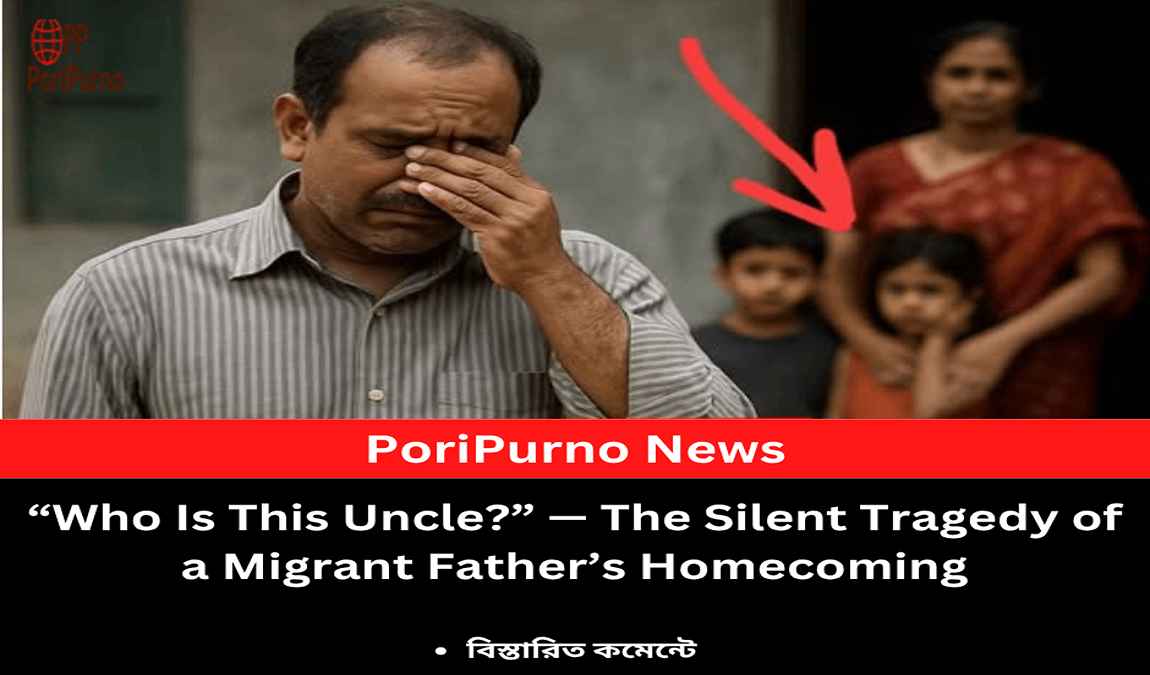PoriPurno News Desk | August 04, 2025
After seven years of relentless labor under the scorching sun of Saudi Arabia’s deserts, Rafiqul finally returned home to his family in a quiet Bangladeshi village. But the moment that was meant to be filled with joy and reunion brought with it a piercing silence—and a child’s question that shattered his heart:
“Mama, who is this uncle?”
Rafiqul is one of the millions of Bangladeshi migrant workers who spend years in the Middle East, separated from their families in search of a better life. Like many others, he left when his son was just one year old. His daughter hadn’t even been born yet. Throughout the years, their interactions were limited to voice and video calls, with his children growing up knowing him only as “the man on the phone.”
When Rafiqul returned to his village, he stepped into his home compound expecting hugs, tears of joy, and laughter. Instead, his son hid behind a door. His daughter clung to her mother’s sari in fear and confusion. He offered them chocolates from his suitcase, but they didn’t come near. In that moment, Rafiqul quietly walked to the back of the house, unable to hide the tears that welled up in his eyes.
That night, lying under the open sky and staring at the stars, he asked his wife,
“Did they not hug me because I’ve become a stranger to them?”
His wife replied gently,
“To them, ‘Baba’ means a mobile screen. A man who sometimes calls. They don’t know your scent, your touch, your presence.”
This deeply emotional moment encapsulates the lived experience of countless migrant fathers—men who spend years sacrificing presence for provision, missing birthdays, school milestones, and the small everyday moments that build bonds.
The Emotional Cost of Economic Migration
Rafiqul’s story is not unique. It is shared silently by many fathers across Bangladesh and beyond who migrate to provide for their families. They build houses, fund education, and put food on the table, but at the cost of becoming strangers in their own homes. The emotional toll of this absence often goes unnoticed amidst remittance figures and GDP contributions.
According to estimates, more than 10 million Bangladeshis live and work abroad—predominantly in the Middle East and Southeast Asia. While their remittances are vital to the national economy, their personal sacrifices rarely make headlines. Many return to find themselves emotionally disconnected from their children, estranged from their spouses, and foreign in the very homes they built.
Experts in social psychology and family development have long warned of the “emotional gap” created by long-term parental absence. While money can sustain a family’s physical needs, the lack of daily emotional presence during a child’s formative years can create lasting psychological impacts—for both the child and the parent.
Increase Your Business with Expert Digital Solutions!
Get Unlimited Facebook Ad Credit, Guaranteed SEO Rankings, & Professional Web Development – all under one roof at MahbubOsmane.com!
14+ Years of Experience – Guaranteed SEO Rankings
800+ Satisfied Clients – Unlimited Facebook Ad Credit
Proven Results, Maximum ROI – Professional Web Development
Contact us ( +8801716988953 WhatsApp ) today and take your business to the next level! Visit: MahbubOsmane.com
A Larger Conversation on Migration and Family
The story of Rafiqul opens a broader conversation about the human cost of migration. While financial necessity often leaves little choice, this narrative highlights the urgent need for better support systems—both for migrant workers abroad and for their families back home.
Digital tools like video calls and messaging apps can only bridge so much of the emotional gap. Experts suggest that programs designed to provide emotional literacy, parent-child bonding strategies, and family reintegration support are crucial for returning migrants. Government agencies, NGOs, and diaspora organizations have a role to play in addressing these long-term social issues, not just economic ones.
A Call for Balance
As the global labor market continues to rely on workers like Rafiqul, it’s time to ask a deeper question: Are we only valuing financial contributions, or are we also ready to support the emotional realities of the families left behind?
Rafiqul’s story serves as a painful yet poignant reminder that being a father is more than sending money—it’s about being there. And for too many migrant fathers, being there remains the one thing they cannot afford.
Do you still have questions? Or would you like us to give you a call?
Call us at wa.me/+966549485900 or wa.me/+8801716988953 to get a free consultancy from our expert or you can directly email us at hi@mahbubosmane.com We would be happy to answer you.
